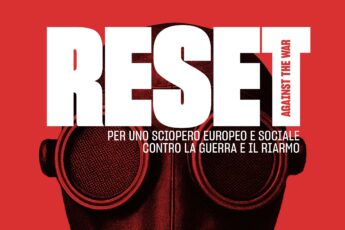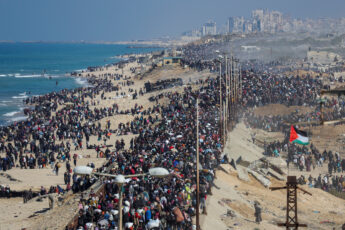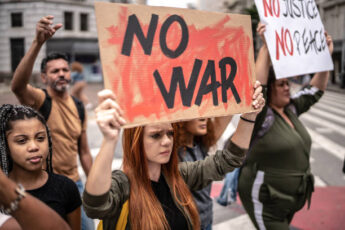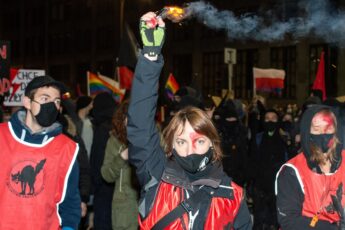
by PERMANENT ASSEMBLY AGAINST THE WAR
Ukrainian – Greek – French – Italian – German – Chinese – Russian
We are women and men, workers and union members, refugees, migrants and antiracist collectives, lgbtq+ people, feminist groups and activists for climate justice, who are part of the Permanent Assembly Against the War launched by the Transnational Social Strike Platform after the Russian invasion of Ukraine. Some of us, living in Ukraine, are under shelling; others are organizing solidarity. Together over the past few months, we have collectively developed an on-going discussion about how to face what we called the ongoing Third World War. We believe that the war serves as a brutal reminder to all of us that we need to struggle against today’s society that reproduces violence, exploitation and environmental degradation. We come from different places and contexts, but as subjects mainly living across the European space, we acknowledge the need to make Europe a field of struggle. We believe this is the time to be brave enough to think and practice a transnational politics for a better life, free from oppression, free from poverty, racism and patriarchy. At this critical juncture, we join to declare these principles:
1. Against the normalization of war, we need a transnational politics of peace
As the war in Ukraine continues, chronicles of death and destruction seem to have become part of everyday normality for those not directly affected. Together with the unbearable weight of human suffering, the normalization of war means the reduction of politics to state power and the domination of capital over life and the environment. The war throws those who are oppressed and exploited into silence. We refuse to turn our backs to what the politics of war is producing so as not to upset anyone or not to follow those who use the war propaganda to keep in check all other conflicts. We know that there has been an on-going war in Ukraine since 2014. We had struggled against other wars in the past. Nevertheless, this war came to us as a shock. In a matter of weeks, Russian invasion of Ukraine has sparked widespread and global consequences, forcing us to face the limits of our actions. Today we need more than ever to invent a new politics to cope with the transnational reality we live in and this rapidly changing political and economic conjuncture.
To refuse the normalization of war means to overcome isolation. We need to go beyond our own territories or nation States and come together in a transnational politics of peace.
2. We fight within and against the Third World War
What we are facing is a world war to establish a new global order. The third world war was in the making for years, in other war scenarios often ignored because far away from the Western stage. With the invasion of Ukraine we now see it in the face. This does not mean that the war is waged only by big powers and everywhere there is war, but that every place in the world is now potentially affected by the war and its consequences. Growing militarization, nuclear threats, the hiding of social conflicts behind fabricated national homogeneity, , energy and food prices fluctuations, the reshaping of supply chains along political convenience and the attempt to govern financial and industrial accumulation through political alliances, are the corollaries of this. We refuse to read the Russian invasion simply as a reaction to NATO’s expansionism and by this to minimize the scale of disaster it has created. Likewise, we refuse to justify the politics of war promoted by ‘Western’ countries with rearmament, economic confrontation and sanctions that are throwing millions of people in poverty and fueling tensions across the globe, strengthened by the new strategic concept of NATO. We refuse to accept the entire system which allows the authoritarian Turkish regime to use migrants as an exchange-commodity at the table of international agreements, and the persecution of Kurdish refugees around Europe as the reward required for accepting NATO’s enlargement. We refuse to identify with this or that government and to be pawns strangled in the clash of interests and ideologies between Putin’s regime, the restructuring of NATO, and the ambitions of Xi’s China. We do not turn our back to what these actors are doing and the effects they are having on lives, income, and labor conditions across the globe.
A transnational politics of peace disrupts the growing international competition by fighting in the conflict between those who pay the price of the war and those who profit from it.
3. Our transnational politics of peace is against an unbearable social peace
We cannot fight the politics of war with an act of will and a simple rhetorical opposition to war erases the differences and shifts of power that the war itself creates. It is not enough to say that we are against all wars if this means in the end not being against any war in particular. We thus do not believe in generic appeals in the name of peace, nor do we trust projects of diplomacy and reconstruction that see opportunities for new resource extraction and exploitation while fueling more war. A transnational politics of peace is shaped here and now within the complexity and contradictions of the present. It stands on the side of workers, migrants, women, and lgbtq+ people, those who defend themselves, those who flee and those who desert the army risking jail and prosecution.
A transnational politics of peace is against the unbearable social peace that wants people to accept the normalization of war and worse living and working conditions.
4. The EU is part of our problems, not the solution
We do not align ourselves with the supposed “European democratic values” that have been mobilized to support the war. The Europe we know and national governments have sustained exploitation through neoliberal policies that have, variously: destroyed social benefits, especially in East Europe; given Big Finance enormous power to penetrate daily life through debt restructuring policies; been complicit with patriarchal attacks on women and Lgbtq+ people; created a differentiated labor market where employers can take advantage of differences and hierarchies among countries and regions; imposed a racist regime upon migrants and those residing outside the Schengen area; and, finally, has extended the reach of policies designed to integrate Eastern European, Central Asian, and African Countries in a transnational regime serving the interests of capital. While the EU and its Member States display public unity in favor of accession for Ukraine and Moldova, they continue to apply a hierarchical visa regime and to play dangerous games by keeping countries in a political waiting room.
A transnational politics of peace aims at overturning the political conditions that sustain exploitation, violence, and oppression: it recognizes the aspirations of those who see in Europe a possibility and builds paths of struggle where they can join forces with those who oppose the European neoliberal and exploitative project.
5. There is no peace if the patriarchal war against women continues
The war in Ukraine is aggravating patriarchal violence both in Ukraine and in the rest of the world. Rape is a weapon. The war is a pretext to enforce gendered hierarchies: the spiral of ubiquitous militarization goes hand in hand with cuts in public spending and neoliberal reforms that strengthen the sexual division of labor and women’s exploitation across the borders. War and the pandemic’s social effects are overlapping: women, especially migrant women, are doing and will continue to do work that is as essential as it is devalued and exploited. They are deemed to be so necessary that they are compelled, via family laws, bans on abortion, patriarchal violence, and poverty, to stick to their roles of mothers and servants. In Russia, the war has become an occasion for strengthening the promotion of “traditional values” and anti-gender, anti-LGBTQ+, anti-abortion campaigns. The war reduces the spaces to struggle against violence and gender oppression, and to militate for sexual freedom.
Opposed to a war that is accelerating the mounting patriarchal backlash spurred by the SARS-CoV-2 pandemic after years marked by the feminist global strike against male violence, a transnational politics of peace subverts the violent patriarchal conditions of social reproduction.
6. We want an unconditional residence permit against racism and the violence of borders
More than 10 million Ukrainians have been displaced because of the war. Many of them fled their country, seeking refuge in a Europe that has suddenly dressed itself in the guise of solidarity and integration. Most of them are women and many of them will be hired in low paid jobs. The EU has finally shown itself to be flexible enough to be able to mobilize to welcome millions of refugees. This is not simply hypocrisy that can be fought on moral terms. This is the way the EU actually works: it produces racist hierarchies between “types” of migrants and distributes portions of rights and possibilities according to the needs of the labor market. Yet this does not prevent Ukrainian refugees, who are now subjected to the blackmail of temporary protection, to be put to work for miserable wages in essential sectors or lodged in crammed hotels or refugee camps. Today, some are welcomed as real refugees, some are pushed back at the border, some, as in the Balkans, are encircled by the EU but excluded from its visa regime. Money and military resources are mobilized to tame mobility, while migrant labor is exploited. This war on migrants that targets them and detects them as hybrid threats is part of the normalization of war.
A transnational politics of peace fights against the racist hierarchies among migrants and the violence of borders, and for an unconditional European resident permit for all.
7. Green transition is a field of struggle against the inevitability of the climate catastrophe
The conflicts over energy and strategic raw materials supplies are part of the third world war scenario we live in. The Unions, States, and Capital are trying to bend in their favor otherwise catastrophic transnational dynamics by delivering industrial and financial plans that pose an untenable alternative between the western ecological democracy and Putin’s authoritarianism. The green transition as a field of capital investments and profits needs now to comply with the war politics. Far from paving the way for more climate friendly energy resources, the planned independence from Russian oil and gas is a way either to delay conversion from coal and local gas, or to strive for finding new sources of supply. The recently launched RePowerEU strategy will affect State’s policies and unequally distribute the ecological costs of the transition with raising inflation and costs of living. The climate catastrophe is looming, but green transition is more clearly than ever a way to make profits in the name of the environment and to fuel wars, profits and exploitation. To fight for climate justice we need to confront the multifarious effects of war competition and the tensions triggered globally by rising energy costs.
A transnational politics of peace escapes from the blackmail of the catastrophe and turns green transition into a field of struggle.
8. We need to build a collective force against the hierarchies of wage
The ongoing war is used to ask for sacrifices and more sacrifices. Already on the rise after the pandemic, the costs of heating, oil, food and the general rising inflation are reaching a point in which wages are not enough to last until the end of the month, producing protests and instability around the globe. As a response to this, the EU has approved a European minimum wage. This will increase wages in some places where many people live below the poverty line and will decrease them in others. This will not bring equal wages for all in Europe: the underlying project is to preserve one part of Europe as a reservoir of cheap labor for the other. Even though the EU applauds those who are ready to “die for Europe” in Ukraine, to be Europeans some must work for poor wages and accept harsh labor laws and, if they are women, support the crumbling welfare of Western Europe. In this sense, supporting self-organized struggles and independent unions is essential, as the state of war menaces the very existence of Ukrainian unions, while in Belarus the government uses repression and imprisons union activists. Putin’s war is a war against social movements and to muzzle any protest movements.
A transnational politics of peace supports and connects workers struggling for higher wages and social benefits for all and aims at overthrowing the wage differentials across countries and conditions that turn some people into second-class or third-class workers.
9. We need to learn to strike again together
Instead of aligning with, or organizing against, this or that power, we stand for a transnational politics where those who resist under the war, those who flee and desert, those who move to seek a better life, and those who struggle against exploitation, violence and oppression can all find their own collective voice and build their own collective power. A transnational politics of peace aims to imagine and practice (again, or for the first time) the possibility of social transformation among different social, geographical and political conditions, to reinvent solidarity seeking collective strategies, to invent new forms of political and social struggle. In order to do so, we need to concentrate our energies and capacities on the social terrains where neoliberal policies have prompted movements, protests, and strikes and are now engulfed by the consequences of war.
A transnational politics of peace strikes the war by fostering political communication and building common strategy to connect emerging struggles in social reproduction, labor and migration and against patriarchal violence. As the Russian anti-war feminists said and as we started doing on May 1st: we need to learn to strike again together. Against war, exploitation, racism and patriarchy. This is our transnational politics of peace.





